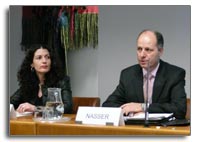
|
|
Jacqueline Niavarani (Advisor, Austrian Federal Ministry for Women and Civil Service), Maher Nasser (Director, UNIS Vienna) |
On Tuesday, 9 March, the United Nations Information Service (UNIS) Vienna, in cooperation with the Vienna NGO Committee on the Status of Women, held a panel discussion under the theme "Equal rights, equal opportunities: Progress for all" to mark International Women's Day 2010 at the Vienna International Centre.
The panelists, Jacqueline Niavarani, Advisor of the Austrian Federal Minister for Women, Media and Regional Policy on Women's Rights, Gender Mainstreaming and Gender Equality, Marlene Parenzan, Chairperson of the Vienna NGO Committee on the Status of Women and Julia Raabe, Editor at the foreign desk of the Austrian daily newspaper "Der Standard", discussed progress made in the implementation of the Beijing Declaration and Platform for Action, portraying global setbacks and advances, and referring to the national level of implementation in Austria.
Maher Nasser, Director UNIS Vienna, who moderated the discussion, said that progress for women would be progress towards achieving the Millennium Development Goals which are one of the priorities set by the United Nations Secretary-General for 2010. He referred to the continuing inequalities between women and men: "Despite genuine progress on many fronts since the adoption of the Beijing Platform for Action in 1995, large disparities can still be found both in developing and developed countries," he stated. "The latest data from the EU statistical agency Eurostat on income disparities in Europe reveals Austria ranking second in gender wage gaps, topped only by Estonia," he continued. Progress for women would be progress towards achieving the Millennium Development Goals which is a priority for the United Nations Secretary-General this year. "The goal of full gender equality remains just as fundamental, if not even more so, today," he said.
Jacqueline Niavarani from the Austrian Federal Ministry for Women and Civil Affairs highlighted the United Nations as a promoter of women's rights and referred to the Convention on the Elimination of All Forms of Discrimination against Women (CEDAW), the UN Security Council Resolution 1325 and gender architecture.
Furthermore she spoke about developments in Austria with regards to women's rights in the field of the labour market, gender budgeting and violence against women. "Austria has already taken a leading role in setting up intervention centres to combat violence against women," she said.
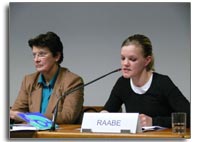
|
|
Marlene Parenzan (Chair, Vienna NGO Committee on the Status of Women), Julia Raabe (Journalist, Der Standard) |
On the question of income disparities between men and women she said that part of it can be explained by training times, length of service in a firm, and age of the employee, but even considering all these factors, more than half the gender-specific wage differences are still unexplained.
Jacqueline Niavarani moreover highlighted the implementation of gender equality policy measures in Austria including the "Anti-Stalking Act" (2006), which contains provisions for improved protection against persistent harassment.
Marlene Parenzan, Chairperson of the Vienna NGO Committee on the Status of Women, briefed on the first week of the UN Commission on the Status of Women (CSW) meeting, where experts and advocates gathered to review the progress made in women's rights since the Beijing Declaration platform of action was agreed upon in 1995. She also spoke about the NGO Global Forum which preceded the Commission session and welcomed the UN general Assembly's proposal to create a new UN body on gender issues. "It is an historic opportunity to give women a stronger voice globally," she stressed.
Julia Raabe, a journalist with the Austrian daily newspaper Der Standard, portrayed the issue of equal opportunities and equal rights of women in the media. Today 42% of all Austrian journalists are women. Though the proportion of women amongst media workers has risen sharply over the past decade (in 1999 only one third of journalists were women), significant gender-specific differences demonstrate that female journalists do not enjoy equal status with their male colleagues. "Female journalists for example earn less than their male colleagues and are more frequently part-timers than men," she said.
"Gender specific differences also exist with regard to the subjects they cover," she noted. "Female journalists predominate in life-style reporting and are scarcely in sports programmes. In addition, only 26% of Austria's top positions in media are held by women."
The speakers and members of the audience engaged in a lively discussion and agreed that to achieve true equality for women, work towards women's political, economic and social empowerment must be continued.
|
Slovenia : exhibition on violence against women A press conference was held on 5 March to mark the opening of a month-long exhibition on violence against women at EU house in Ljubljana on the occasion of International Women's Day. It was organized by European Parliament Information Office in Slovenia and the Spanish Embassy in Ljubljana, with the participation of the European Commission Representation in Slovenia, UNIS Vienna, Association SOS Help Line, the KLJUC Society, the Association against Violent Communication, United Nations Association of Slovenia, Women's Lobby Slovenia and Women's Counselling Service. Speakers symbolically tore down newspaper articles containing stories on violence against women, underlining that such crimes cannot be tolerated. |
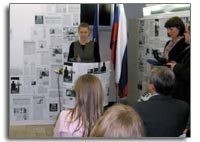
|
|
Hungary : debate on global situation of women International Women's Day was marked at the Alternative Secondary School of Economics in Budapest with a briefing and debate with Sonja Wintersberger from UNIS Vienna, on the global situation of women, 8 March. |
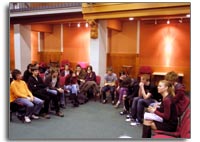
|
|
Slovakia : events in Levice The Business Academy Levice, with the support of UNIS Vienna, celebrated International Women's Day with an information stand set up by students in the pedestrian zone of Levice. There were presentations on situation of women in the world today and on violence against women. |
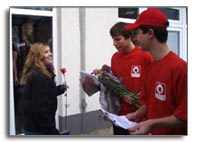
|